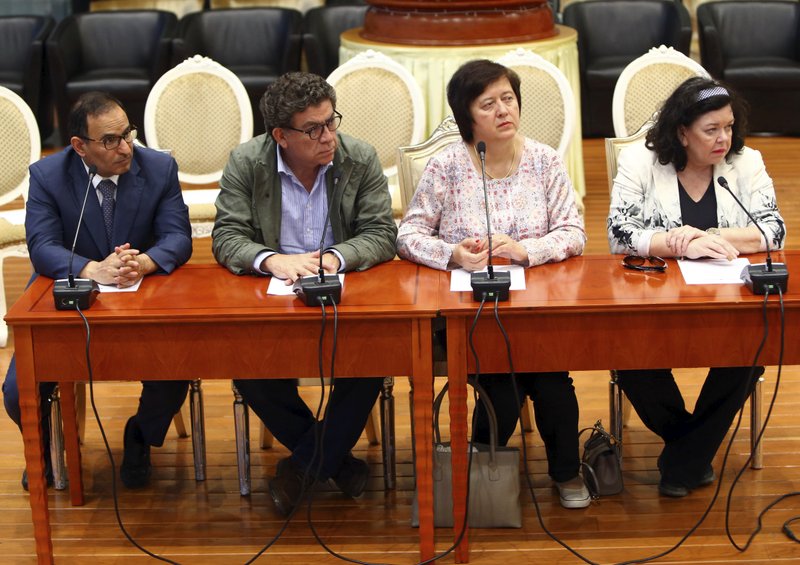NAYPYITAW, Burma -- A U.N. Security Council delegation on Tuesday visited Burma's Rakhine state, from where hundreds of thousands of Rohingya Muslims have fled military-led violence.
Delegation members said they hope to help the refugees return quickly and safely to their homes there.
About 700,000 Rohingya fled the troubled area for squalid camps in Bangladesh last year as Burma's army carried out a brutal crackdown after insurgent attacks on security posts.
State television showed the ambassadors touring the border area. Traveling by helicopter, they visited two villages, a transit center and a reception camp, where refugees who return will initially be housed.
They also met with members of different groups affected by the violence and upheaval, including Rakhine Buddhists, Hindus and some Rohingya Muslims who did not flee.
The ambassadors visited refugees in Bangladesh over the weekend, and on Monday held talks with Burmese officials, including the country's leader, Aung San Suu Kyi, and military commander in chief Senior Gen. Min Aung Hlaing.
At a news conference in Burma's capital, Naypyitaw, before flying out of the country, the ambassadors reminded the government of its obligations as a member of the United Nations. The envoys represent the 15 countries making up the Security Council, the U.N.'s most powerful body.
"We are not asking Myanmar government something new. They are a member of the United Nations and they are a member and state party to many U.N. conventions. The return of refugees should be in conformity with international standards," said Kuwait's representative, Mansour Al-Otaibi.
Burma is often called Myanmar, a name that military authorities adopted in 1989. Some nations, such as the United States and Britain, have refused to adopt the name change.
Bangladesh and Burma agreed in December to begin repatriating the refugees in January, but there were concerns among rights groups and Rohingya that they would be forced to return and face unsafe conditions in Burma.
In its counterinsurgency sweeps in Rakhine state after the attacks in August on security personnel, Burma's military was accused of human-rights violations, including rape, killing, torture, and the burning of Rohingya homes, that U.N. and U.S. officials have called ethnic cleansing.
The Muslim Rohingya face official and social discrimination in predominantly Buddhist Burma, which denies most of them citizenship and rights because they are looked on as immigrants in the country illegally after leaving neighboring Bangladesh, even though many settled in Burma generations ago.
"Basically the message we convey is it is very important to improve the security conditions for the return of the refugees, and also collaboration with the international organization, particularly the United Nations," said Gustavo Meza-Cuadra, ambassador of Peru. "And we also mentioned the importance of the investigation regarding what happened here before the refugees went to Bangladesh."
The U.N. refugee agency and Bangladesh recently finalized a memorandum of understanding that said the repatriation process must be "safe, voluntary and dignified, in line with international standards."
The Security Council delegation has asked Burma's government to sign the memorandum.
"We believe that if the memorandum of understanding can be signed quickly and the U.N. agencies given unconditional access, that would be the best thing to do with the scale of the problem," said Karen Pierce, Britain's ambassador to the United Nations.
Pierce parried a journalist's question about whether the U.N. should make a referral to the International Criminal Court to investigate the atrocities alleged to have been carried out by Myanmar security forces, acknowledging only that it could be one avenue of investigation.
In New York, U.N. deputy spokesman Farhan Haq noted at a briefing that "around 500,000 Rohingya still live in Rakhine, facing continued discrimination and marginalization, including around 130,000 men, women and children who are trapped in appalling conditions in camps."
Burma's government agreed to allow the Security Council to visit after previously rejecting U.N. requests for a trip by a specially appointed independent fact-finding committee.
Information for this article was contributed by Edith M. Lederer of The Associated Press.
A Section on 05/02/2018

